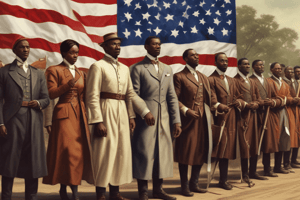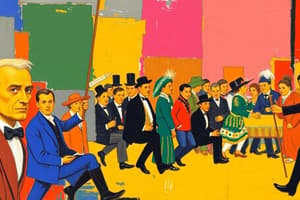Podcast
Questions and Answers
What legislation aimed to maintain the rights of freedmen and was passed by the North in response to the black codes?
What legislation aimed to maintain the rights of freedmen and was passed by the North in response to the black codes?
What were the laws called that enforced racial segregation and mandated the legal separation of races in public facilities?
What were the laws called that enforced racial segregation and mandated the legal separation of races in public facilities?
Which group strongly advocated for the Reconstruction aimed at achieving black equality?
Which group strongly advocated for the Reconstruction aimed at achieving black equality?
Which amendment abolished slavery throughout the United States?
Which amendment abolished slavery throughout the United States?
Signup and view all the answers
What was the primary goal of Abraham Lincoln at the beginning of the Civil War?
What was the primary goal of Abraham Lincoln at the beginning of the Civil War?
Signup and view all the answers
What was the significant outcome of the Emancipation Proclamation on January 1, 1863?
What was the significant outcome of the Emancipation Proclamation on January 1, 1863?
Signup and view all the answers
What was the effect of the sharecropping system in the South post-Civil War?
What was the effect of the sharecropping system in the South post-Civil War?
Signup and view all the answers
During which event did 15,000 Confederate soldiers attack Union lines, marking a significant point for the Confederacy?
During which event did 15,000 Confederate soldiers attack Union lines, marking a significant point for the Confederacy?
Signup and view all the answers
Signup and view all the answers
Study Notes
Reconstruction Era
- President Lincoln believed Southern states had seceded and required readmission on Congressional terms
- Black Codes restricted freedoms for newly freed slaves, limiting liberties like voting and land ownership
- The 14th Amendment ensured citizenship and rights to formerly enslaved individuals
- Johnson's veto of the Civil Rights Act of 1866 led to Congressional efforts to pass the 14th Amendment
- Reconstruction aimed to rebuild the South and integrate formerly enslaved individuals; factors that could have improved its success include a stronger suppression of anti-African American groups like the Ku Klux Klan and refraining from interfering with Southern property rights.
Battle of Antietam
- The Battle of Antietam was significant due to its influence on the war's course
- Lee's invasion of the North was halted, impacting the Confederate's chances
- It delayed Lincoln's Emancipation Proclamation and potentially prevented European intervention
Emancipation Proclamation
- The 1863 Emancipation Proclamation freed slaves in Confederate states actively rebelling against the Union
- It did not apply to border states or areas under Union control
General William T. Sherman
- Sherman's strategic approach involved total war, targeting civilian infrastructure to diminish Southern morale and will to fight
- Focusing on destroying civilian morale through war was a key aspect of Sherman's strategic thinking
Union Successes and Civil War
- The Union's victory at Gettysburg and other key battles was particularly critical to Lincoln's reelection in 1864
- Confederate leaders after the war were controversially offered various treatments,ranging from prison terms to pardons
- Lincoln hoped that the ending of the Civil War would reintegrate Southern states into the Union peacefully. However, many different viewpoints existed on the necessary steps toward achieving this goal.
Reconstruction and Black Rights
- Groups like the Ku Klux Klan represented a threat to formerly enslaved individuals during the Reconstruction era
- The 1876 election involved a compromise among competing political factions that resulted in the removal of federal troops from the South, which ultimately hindered Reconstruction and harmed the rights of African Americans.
1876 Presidential Election and Reconstruction
- The 1876 presidential election was disputed, and a compromise between political parties led to the withdrawal of federal troops from the South
- This withdrawal effectively ended Reconstruction and contributed to a significant decline in the political and civil rights of African Americans in the South
Reconstruction Era Goals
- The main goal of the Ku Klux Klan's actions during Reconstruction was to suppress African Americans and counter Reconstructionist efforts in the South. This attempted to maintain the social order and hierarchy of the region as it had existed before the Civil War.
- The main goal of the Radical Republicans in Reconstruction was to ensure the rights of formerly enslaved people and dramatically alter the South' political landscape.
Studying That Suits You
Use AI to generate personalized quizzes and flashcards to suit your learning preferences.
Related Documents
Description
Explore the key events and consequences of the Reconstruction Era, including the impact of the 14th Amendment and the challenges faced by newly freed slaves. Additionally, delve into the significance of the Battle of Antietam in shaping the Civil War. This quiz will test your understanding of these pivotal moments in American history.




